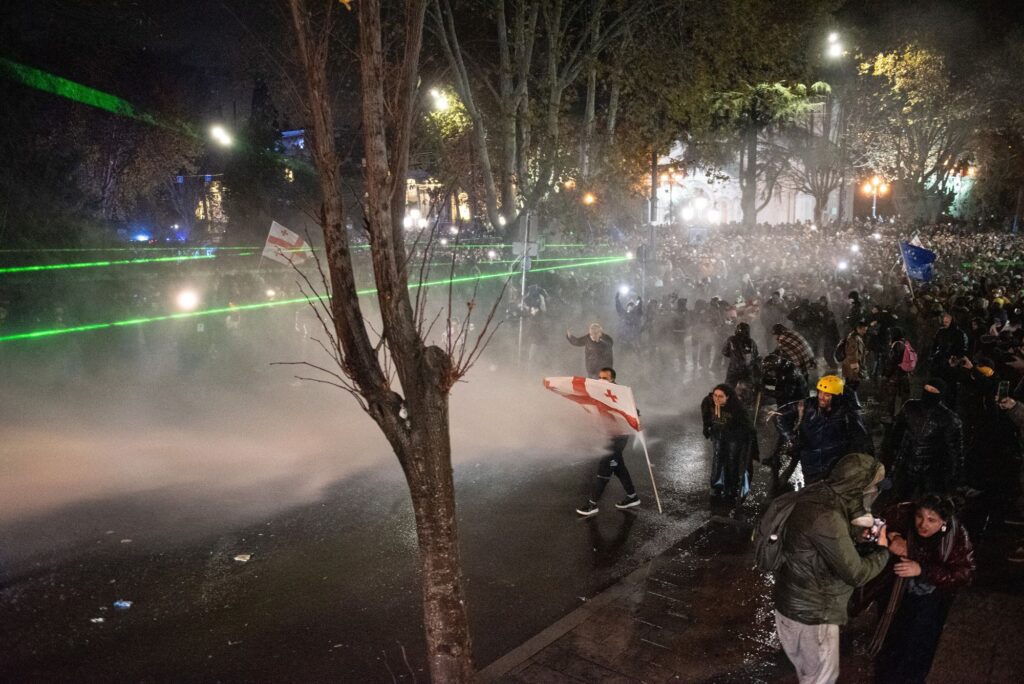
Georgian businesses, diplomats, universities launch strikes after crackdown on pro-EU protesters
After yesterday’s announcement by Georgian Prime Minister Irakli Kobakhidze that the country would suspend negotiations on EU membership until 2028, significant protests erupted across various cities in the country.
The protests come amid Georgia’s pivot toward Russia, reversing the small Caucasian country’s Euro-Atlantic aspirations since 2008. Critics argue that the ruling Georgian Dream party has increasingly aligned itself with Moscow, undermining Georgia’s long-standing aspirations for EU membership and Western democratic values.
While protests have been ongoing in the country since 26 October, when the pro-Russian Georgian Dream claimed victory in a disputed election marred by accusations of vote rigging, they have stayed largely peaceful until the night of 28 November. Then, riot police cracked down on protesters against the abandonment of EU talks in the capital, Tbilisi. Dozens were beaten and detained by special forces; the exact number remains unknown.
Protests are resuming in the Georgian capital and other cities.
Riot police have mobilized near the parliament, where Georgians are protesting for the country’s pro-EU path
(1/3)#GeorgiaProtests #TbilisiProtests pic.twitter.com/08CSHiH7Qg
— Tabula Media (@Tabula_Media) November 29, 2024
Alongside Tbilisi, anti-Russian protests are taking place in other cities across Georgia: Batumi, Kutaisi, Poti, and Akhmeta.
Video from Akhmeta.#GeorgiaProtests pic.twitter.com/6okNUvbDe0
— PUBLIKA (@Publika_ge) November 29, 2024
However, the resistance extends beyond the streets, OC-media and JAM news report.
13 business associations have issued a joint statement strongly opposing the Georgian Dream leadership’s decision to halt Georgia’s EU accession. The associations have expressed categorical disagreement with GD’s move, emphasizing their commitment to the country’s European integration. “By refusing to join the European Union, Georgia risks missing out on an opportunity to improve the lives of its citizens,” the statement reads.
Schools and universities are publishing open letters condemning Georgia’s renouncing of the European path.
Over 220 Ministry of Education, Science, and Youth Affairs employees have issued a joint statement criticizing the Georgian Dream’s decision, stating it is not in line with the country’s strategic interests, which they have been serving for years.
More than 110 employees of the State Services Development Agency stated that the Georgian Dream’s decision harms the country’s interests and significantly undermines citizens’ ability to have decent living conditions.
The protest has spread to educational institutions, with multiple universities suspending academic activities. The University of Georgia announced, “There are moments in the life of the country when you have to put everything aside… We believe that today everyone’s first duty is to return Georgia to the European future.”
The diplomatic corps has also joined the protest. Georgia’s Ambassador to Bulgaria, Otar Berdzenishvili, resigned from his position, stating that the efforts of Georgian diplomats to advance Georgia’s Euro-Atlantic aspirations “shouldn’t be undermined or compromised by any means.”
More than 40 Defense Ministry employees issued a joint statement emphasizing that European and Euro-Atlantic integration is “an alternative way to further strengthen the country’s security and sovereignty.” They highlighted the importance of Georgia’s cooperation with European and Euro-Atlantic structures in developing Georgia’s defense capabilities.
As well, 16 employees of the Constitutional Court have denounced the Georgian Dream’s decision, stating that it “ignores the constitutional will of the citizens of Georgia” and the Georgian Constituion, which has enshrined Euroatlantic integration as Georgia’s geopolitical path.
International reaction has been swift, with multiple European leaders expressing concern. Estonia’s Foreign Minister Margus Tsahkna criticized Georgian Dream’s statement, saying it was “the final step and proof that they have lied to the people of Georgia.”
Ukraine’s Foreign Ministry called the decision “evidence of the curtailment of democratic processes in the country in favor of Moscow.”
Related:












